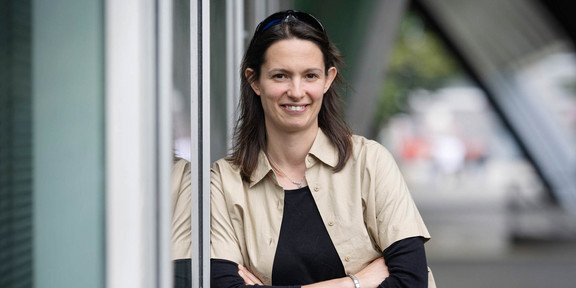Giulia Barbareschi Promotes Inclusion through Innovation
- Research Alliance Ruhr
- UA Ruhr
- Research

Prof. Dr Giulia Barbareschi from the Research Center Trustworthy Data Science and Security of the University Alliance Ruhr (UA Ruhr) strives to design technologies in such a way that no one is excluded. “Whether artificial intelligence or virtual reality – technology can connect people and spark joy and curiosity. That's exactly what I want to achieve,” says Barbareschi. The 39-year-old acknowledges the potential of AI, but remains critical. “AI is often based on data and models that only apply to a few of us. We need to question the assumptions behind intelligent technologies and develop systems that better support minorities. Otherwise, algorithmic biases mean they are more likely to experience discrimination and disadvantage.”
In addition to human-computer interaction, Prof. Dr Giulia Barbareschi at the Research Center Trustworthy Data Science and Security of the University Alliance Ruhr (UA Ruhr) is particularly interested in how technology can bring people into contact with each other. “Technology should not isolate, but connect," she says. “We have to design it in such a way that people who would hardly ever meet in everyday life – across generations or language barriers, for example – can engage in conversation with each other.” To this end, she is investigating what unusual encounters arise through telepresence robots, virtual reality or multisensory technologies – for example, between people of different ages, cultural backgrounds or physical and cognitive disabilities.
Barbareschi's work does not end in the laboratory – it extends to regions where communication determines participation or exclusion. As Research Lead at the Centre for Digital Language Inclusion, she is working to further develop speech recognition for African languages so that people with impaired speech – such as those who have suffered a stroke or have cerebral palsy – can also be understood. For many, it is a daily struggle to be understood at the doctor's office or at the market. “When technology gives a voice a hearing, it changes a life,” says Barbareschi.
After completing her physiotherapy studies (2005-08), Giulia Barbareschi specialised in medical device science in Galway (Ireland) and received her PhD from University College London (England) in 2018 for her work on the development of new technologies for wheelchair transfers in everyday life. She gained international experience at the WHO and was involved with the Global Disability Innovation Hub from 2019 to 2021. Before being appointed to the University of Duisburg-Essen, she taught and conducted research as a senior assistant professor for inclusive technologies at the Keio School of Media Design (Japan) from 2021.
More information:
https://rc-trust.ai/groups/inclusive-technology-and-collective-engagement

